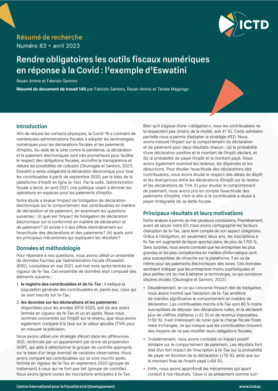Résumé de recherche 83
In order to reduce physical contact, Covid-19 has forced many tax administrations to adopt digital technologies for tax declarations and tax payments. Beyond the fight against the pandemic, electronic filing and payment hold great promise for facilitating tax compliance, increasing transparency and reducing opportunities for collusion (Okunogbe and Santoro, 2021). Eswatini has made electronic filing mandatory for all taxpayers from September 2020, through the e-Tax (e-Tax) platform. Subsequently, the tax administration launched, in April 2021, a policy to eliminate cash transactions for tax payments. Our study assessed the impact of the electronic filing requirement on taxpayers’ filing and payment behavior, examining the following questions: (i) what is the impact of the electronic filing requirement on the reporting and payment compliance? (ii) are there any ripple effects on the accuracy of declarations and payments? (iii) what are the main mechanisms that explain the results? Summary of Working Paper 140 by Fabrizio Santoro, Razan Amine and Tanele Magongo. (i) what is the impact of the electronic reporting requirement on reporting and payment compliance? (ii) are there any ripple effects on the accuracy of declarations and payments? (iii) what are the main mechanisms that explain the results? Summary of Working Paper 140 by Fabrizio Santoro, Razan Amine and Tanele Magongo. (i) what is the impact of the electronic reporting requirement on reporting and payment compliance? (ii) are there any ripple effects on the accuracy of declarations and payments? (iii) what are the main mechanisms that explain the results? Summary of Working Paper 140 by Fabrizio Santoro, Razan Amine and Tanele Magongo.

